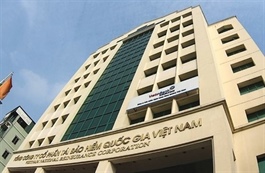Fed goes big with long-awaited cut
Fed goes big with long-awaited cut
The US Federal Reserve’s latest interest rate cut is expected to ease pressure on Vietnam’s exchange rates, support domestic monetary policy, and potentially reverse foreign capital outflows, benefiting the country’s stock market and general economy.

The US Federal Reserve last week cut its key interest rate by 50 basis points, double the more typical 0.25 percentage point level, bringing the target range down to 4.75-5 per cent. This marks the first rate reduction since 2020, and is generally viewed as a positive development for global markets.
The recent recovery in Vietnam’s stock market, according to Nguyen The Minh, head of Retail Client Analysis at Yuanta Securities, can be attributed to pre-emptive market reactions to these key developments.
“There are two main drivers behind the market’s upward trend: the Fed’s interest rate cut, and the fact that many stocks were heavily oversold in recent sessions, making valuations more attractive,” Minh said.
Minh further explained that the market’s price-to-earnings ratio had dropped to approximately 13.5x, with a projected ratio for 2024 at 12x. “The market has been discounted, and this has made valuations more appealing,” he noted.
Nguyen Duc Khang, head of Research at Pinetree Securities, agreed that the Fed’s decision was significant but stressed the need to consider the broader implications for both the United States and Vietnam’s economies.
“On one hand, the rate cut signals potential recession risks in the US, which could negatively impact Vietnamese exports, as the US is one of Vietnam’s largest trading partners. A slowdown in demand would directly affect export-oriented sectors,” he explained.
However, Khang pointed out a silver lining. “The Fed’s rate cut will likely ease pressure on exchange rates, giving the State Bank of Vietnam more room to maintain its accommodative monetary policy. This could positively impact businesses and consumers, as lower interest rates will help stimulate economic activity domestically.” He also noted that exchange rates had stabilised after a prolonged period of volatility.
While Fed chair Jerome Powell warned against hasty monetary easing, Khang believes the rate cut represents a pivotal shift in the Fed’s policy direction. “Although Powell has signalled a measured approach, this cut marks an important turning point in the Fed’s policy trajectory,” Khang emphasised.
Looking forward, the long-term outlook for Vietnam’s stock market will be shaped by further US interest rate movements. Current forecasts suggest the Fed may lower rates by another 50 basis points in 2024, with a 75 per cent probability of a 75 basis point reduction. The Fed’s Dot Plot, which reflects the interest rate projections of Federal Open Market Committee members, indicates that rates could fall by 100 basis points in 2025 and another 50 basis points in 2026, potentially bringing the federal funds rate down to 2.75-3 per cent by the end of 2026.
This easing of US monetary policy could help reverse the trend of foreign capital outflows from Vietnam’s stock market, which has persisted for nearly two years.
“We’ve already seen signs of foreign investors returning to regional markets like Thailand. With the Fed easing rates, there’s a strong possibility that foreign investors will stop their net selling in Vietnam and may even return to the market,” Khang remarked.
An analyst from An Binh Securities said the VN-Index will be significantly influenced by Vietnam’s domestic economic strength, along with its fiscal and monetary policies “However, given Vietnam’s open economy and the crucial role the US plays in global trade, the impact of the Fed’s easing policies will be determined by whether the US economy experiences a hard or soft landing. Investors should keep a close eye on these developments to make timely adjustments to their portfolios,” he added.
Khang of Pinetree Securities identified two key sectors that could benefit in the near term.
“Firstly, large-cap stocks that foreign investors favour – such as Vinamilk, ACB, MB, and Mobile World Group – are well-positioned to attract foreign capital if this trend reverses. Secondly, companies benefiting from strong domestic consumption growth, like Masan and PNJ, are set to capitalise on improved consumer spending in the fourth quarter,” he noted.

























